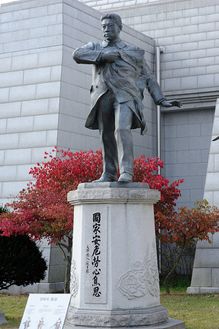Independence Activist and Patriotic Assassin, An Jung-geun
On October 26, 1909, Korean independence-activist An Jung-geun (1879-1910) assassinated Ito Hirobumi, the first Japanese Resident-General of Korea, at Harbin Railway Station in China.
Ito was the architect of Japanese policies to annex Korea, forcing Emperor Gwangmu (i.e. King Gojong) of the Korean Empire to sign the Japan-Korea Protectorate Treaty of 1905 (“Eulsa Treaty”). On the other hand, Ito was a widely respected figure in Japan, as the leader who led Japan’s modernization, serving four times as Japan’s prime minister. Therefore, many were shocked by the assassination.
Back in 1906, An Jung-geun took over the Samheung and Donui schools in Jinnampo to concentrate on the education of young people. But after the Japan-Korea Treaty of 1907 was signed, An felt that working to maintain Korea’s independence in Korea was becoming difficult, and moved to Jiandao, China, and then to Vladivostok, Russia where he organized the Dongui-hoi Group and taught its members patriotism and also provided military training. In March 1909, An organized a secret group named Danji-hoi with 12 other members. They vowed to assassinate Ito Hirobumi and Yi Wan-yong, both of whom had spearheaded the annexation and invasion, within three years.
After emerging victorious from the Russo-Japanese War in 1904, Japan the gained Liaodong Peninsula and Port of Lushun. To tour the newly acquired Manchuria, Ito departed Tokyo on October 12, 1909. He was planning to have a meeting with Russian representative Vladimir Kokovtsov in Harbin.
The special train carrying Ito arrived at Harbin Station, and after a 25-minute discussion with Kokovtsov on the train, Ito had disembarked toward the welcoming crowd when An Jung-geun jumped out and shot him. An yelled-out a slogan for for Korean independence three times in Russian while waving the Korean flag, then was arrested by the Russian police.
In the preliminary interrogation by the Russian prosecutor, An Jung-geun stated that he killed the head of the enemy in a war for independence, as a Lieutenant General of the Korean Resistance Army and not as an individual. Hence he requested to be treated as a POW rather than a murder suspect, but the request was denied.
During the trial in the Japanese colonial court, An stated 15 reasons for Ito’s assassination including massacring innocent Korean people, forcing unequal treaties on Korea to usurp the authority of the Korean government by force, disbanding Korean armed forces, and breaking the peace in East Asia. Many of his captors became enchanted with his genuine cause and personality, and treated him with respect.
An was sentenced to death on February 14, 1910. Just before his execution on March 26, he stated his final wish that “I have done this deed for peace in East Asia, therefore I hope the two countries – Korea and Japan – will cooperate for peace in East Asia after my death.”
The remains of An Jung-geun are buried near the Lushun prison, but the precise location is unknown despite North and South Korean governments’joint effort to locate it. An was only able to complete the introduction of his book, On Peace in East Asia.
Related Articles
- Shouts for Independence through Wails of Sorrow - The Japanese Occupation Period
- Sino-Japanese and Russo-Japanese Wars: Foreign Powers Making the Korean Peninsula their Battleground
- The Independence Movement and Liberation
- An Jung-geun
- Ito Hirobumi
- Vladimir Kokovtsov
- King Gojong (Joseon)
- Harbin Railway Station
- Yi Wan-yong
- Liaodong Peninsula
- Port of Lushun
- Manchuria
- Jinnampo
- Jiandao, China
- Vladivostok, Russia
- Russo-Japanese War in 1904
- Japan-Korea Protectorate Treaty of 1905 )
- Japan-Korea Treaty of 1907
- Samheung School
- Donui School
- Dongui-hoi Group
- Danji-hoi
- Korean Resistance Army


